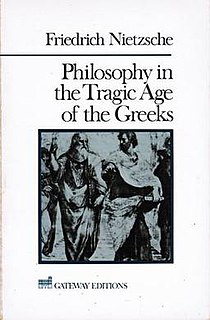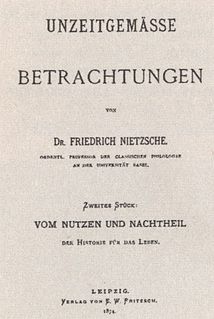 W
WThe Antichrist is a book by the philosopher Friedrich Nietzsche, originally published in 1895. Although it was written in 1888, its controversial content made Franz Overbeck and Heinrich Köselitz delay its publication, along with Ecce Homo. The German title can be translated into English as either The Anti-Christ or The Anti-Christian, depending on how the German word Christ is translated.
 W
WBeyond Good and Evil: Prelude to a Philosophy of the Future is a book by philosopher Friedrich Nietzsche that expands the ideas of his previous work Thus Spoke Zarathustra with a more critical and polemical approach. It was first published in 1886.
 W
WThe Birth of Tragedy from the Spirit of Music is an 1872 work of dramatic theory by the German philosopher Friedrich Nietzsche. It was reissued in 1886 as The Birth of Tragedy, Or: Hellenism and Pessimism. The later edition contained a prefatory essay, "An Attempt at Self-Criticism", wherein Nietzsche commented on this earliest book.
 W
WThe Dawn of Day or Dawn or Daybreak is an 1881 book by the German philosopher Friedrich Nietzsche. The Nietzsche scholar Keith Ansell-Pearson writes that Dawn is the least studied of all of Nietzsche's works.
 W
WEcce Homo: How One Becomes What One Is is the last original book written by philosopher Friedrich Nietzsche before his death in 1900. It was written in 1888 and was not published until 1908.
 W
WThe Gay Science, occasionally translated as The Joyful Wisdom or The Joyous Science is a book by Friedrich Nietzsche, first published in 1882 and followed by a second edition, which was published after the completion of Thus Spoke Zarathustra and Beyond Good and Evil, in 1887. This substantial expansion includes a fifth book and an appendix of songs. It was noted by Nietzsche to be "the most personal of all [his] books", and contains the greatest number of poems in any of his published works.
 W
WHuman, All Too Human: A Book for Free Spirits is a book by 19th-century philosopher Friedrich Nietzsche, originally published in 1878. A second part, Assorted Opinions and Maxims, was published in 1879, and a third part, The Wanderer and his Shadow, followed in 1880.
 W
WOn the Genealogy of Morality: A Polemic is an 1887 book by German philosopher Friedrich Nietzsche. It consists of a preface and three interrelated treatises that expand and follow through on concepts Nietzsche sketched out in Beyond Good and Evil (1886). The three treatises trace episodes in the evolution of moral concepts with a view to confronting "moral prejudices", specifically those of Christianity and Judaism.
 W
WPhilosophy in the Tragic Age of the Greeks is an incomplete book by Friedrich Nietzsche. He had a clean copy made from his notes with the intention of publication. The notes were written around 1873. In it he discussed five Greek philosophers from the sixth and fifth centuries BC. They are Thales, Anaximander, Heraclitus, Parmenides, and Anaxagoras. He had, at one time, intended to include Democritus, Empedocles, and Socrates. The book ends abruptly after the discussion of Anaxagoras's cosmogony.
 W
WThus Spoke Zarathustra: A Book for All and None is a philosophical novel by German philosopher Friedrich Nietzsche, composed in four parts written and published between 1883 and 1885. Much of the work deals with ideas such as the "eternal recurrence of the same," the parable on the "death of God" and the "prophecy" of the Übermensch, which were first introduced in The Gay Science. Nietzsche himself considered Zarathustra to be his magnum opus.
 W
WTwilight of the Idols, or, How to Philosophize with a Hammer is a book by Friedrich Nietzsche, written in 1888, and published in 1889.
 W
WUntimely Meditations, also translated as Unfashionable Observations and Thoughts Out Of Season, consists of four works by the philosopher Friedrich Nietzsche, started in 1873 and completed in 1876.
The Will to Power is a book of notes drawn from the literary remains of the philosopher Friedrich Nietzsche by his sister Elisabeth Förster-Nietzsche and Peter Gast. The title derived from a work that Nietzsche himself had considered writing. The work was first translated into English by Anthony M. Ludovici in 1910, and it has since seen several other translations and publications.